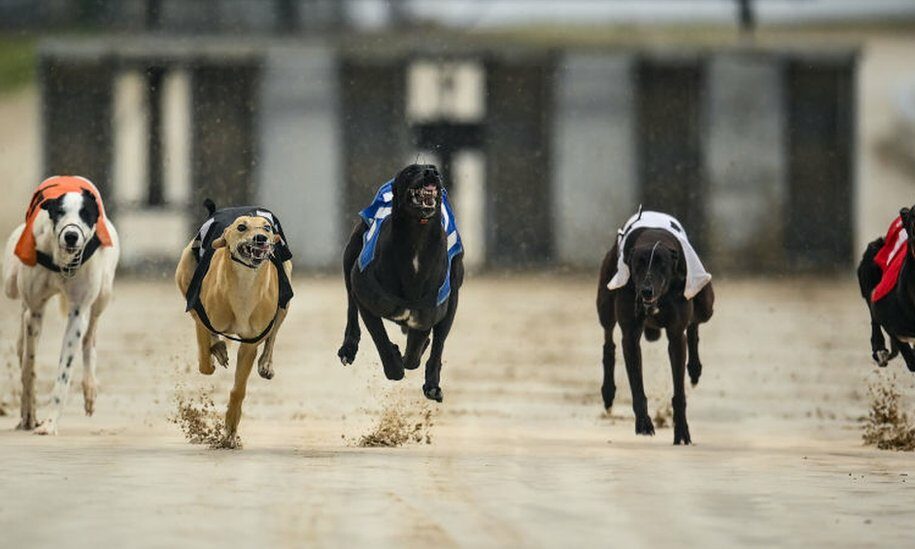Speaking on behalf of the #CutTheChase campaign, Billie-Jade Thomas explains how greyhound racing has found itself at the forefront of the political agenda in Wales.
The end of another Senedd year is fast approaching, providing a timely opportunity to reflect on the political attention greyhound racing has attracted in Wales as of late.
Valley Greyhounds Stadium in Ystrad Mynach is the only stadium left in Wales where racing still takes place, usually once a week on a Saturday. Wales is one of only ten countries in the world – including all other UK nations – where commercial greyhound racing is still legal in 2023.
The movement to phase out greyhound racing was initially spearheaded by Hope Rescue, who along with Greyhound Rescue Wales (GRW), spent years – and funds – taking in surplus and injured dogs from the track near Caerphilly. In September 2021, Hope Rescue launched a petition calling for a ban on greyhound racing in Wales, which was eventually signed by more than 35,000 people. Three organisations have recently joined forces alongside GRW and Hope Rescue to campaign for a phased end, including Blue Cross, Dogs Trust, and the RSPCA.
A phased end is needed to allow the racing industry and animal welfare organisations to carefully plan and coordinate the care of the many dogs affected.
As anyone familiar with the Senedd’s petitions process will attest to, achieving this many signatures is no small task. In fact, Hope Rescue’s reached more signatures than any finalised petition that has come before this committee since its inception in 2021. More importantly perhaps, the number of signatures from Wales alone – 18,707 or 53% of the total – far exceeded the ten thousand needed for any petition to be considered for a Senedd debate.
On March 8, the Senedd debated greyhound racing, following the publication of the Petitions Committee’s report – The Final Bend?. This report confirms that a majority of the committee’s members support a phased ban on greyhound racing in Wales and encourage the Welsh Government to consider the plight of dogs traveling through Wales on their way to races too. Following the debate where members from all four parties expressed concerns for the welfare of racing greyhounds, 44 MSs opted to officially note the report, while six abstained and four voted against. It has since been confirmed that the Welsh Government will consult on a ban on greyhound racing later this year, providing all stakeholders with an opportunity to contribute and share their evidence.
Gofod i drafod, dadlau, ac ymchwilio.
Cefnogwch brif felin drafod annibynnol Cymru.
As March’s debate demonstrated, the phased end to greyhound racing has something which can be difficult to obtain in the Senedd at the best of times: cross-party support. Greyhound racing has also highlighted the role of the Petitions Committee – arguably, the most important tool to facilitate public engagement with the Senedd – and how its work can pave the way for potential changes in legislation.
As it stands, Valley Greyhounds is independent and unregulated, with no requirement for it to record or share any statistics about the number of dogs injured or euthanised there due to racing. However, its owners are in the process of applying for a license from the Greyhound Board of Great Britain (GBGB) – the self-regulating organisation which governs licensed racing in the UK. GBGB regulates 20 stadiums in England where in 2021 alone, 120 dogs died and 4,422 injuries occurred. Based on these figures, each regulated stadium can expect an average of six fatalities and 221 injuries over the course of a year. It is therefore unsurprising that many members of the public are keen for this not to be replicated in Wales.
The latest statistics from GBGB also show how reliant the industry is on charities and trusts when it comes to rehoming retired racers, with more than two thirds of these greyhounds taken in by such organisations at the end of their careers. More dogs racing in Wales would mean more dogs needing to be rehomed once their racing career has ended, equating to a further burden on an already over-stretched sector.
Greyhound racing has also highlighted the role of the Petitions Committee – arguably, the most important tool to facilitate public engagement with the Senedd
Like Hope Rescue and GRW, the RSPCA has also spent years engaging with the industry to secure welfare improvements along with Blue Cross and Dogs Trust. In 2022, the RSPCA, Blue Cross, Dogs Trust and GRW each changed their policies to call for a phased end to the activity. This is because we firmly believe that it is impossible to ensure that each and every greyhound has a good quality of life before, during and after their racing careers. The only way to truly safeguard the welfare of the dogs in this industry is to phase it out entirely.
A phased end is needed to allow the racing industry and animal welfare organisations to carefully plan and coordinate the care of the many dogs affected. Our organisations want to see an end to greyhound racing announced to put a stop to the unnecessary and completely preventable deaths and injury of countless dogs every year. Wales has already demonstrated its ability to set its own high animal welfare standards by being the first UK nation to ban electric shock collars for dogs, with prohibitions on the use of both snares and glue traps also expected to become law soon. Becoming the first UK nation to ban greyhound racing would further prove our commitment to the welfare of our fellow creatures while showing that risking dogs’ lives for the sake of entertainment has no place in a modern, compassionate Wales.
All articles published on the welsh agenda are subject to IWA’s disclaimer. If you want to support our work tackling Wales’ key challenges, consider becoming a member.
This article was edited by Gracie Richards thanks to the Books Council of Wales’ New Audiences Fund.





